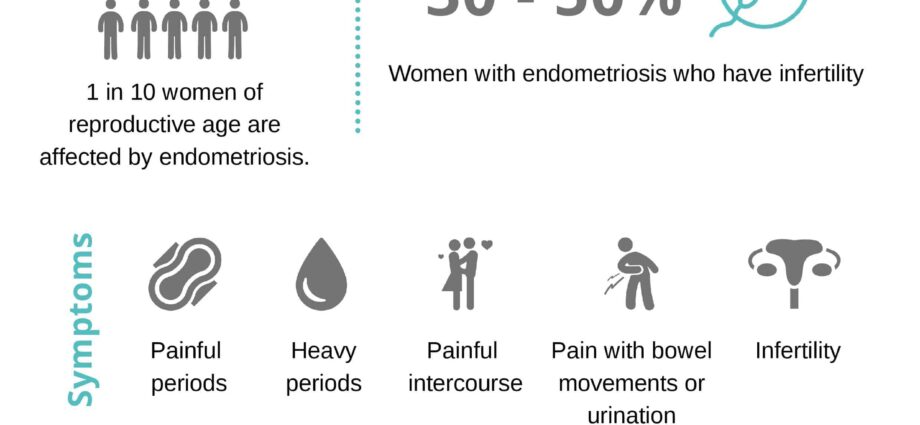Turinys
- Endometriozė ir nėštumas: simptomai ir rizika
- Kas yra endometriozė?
- Endometriosis, how does it work?
- Kokie yra dažniausiai pasitaikantys simptomai?
- Pregnancy in case of endometriosis, is it possible?
- What treatment in the event of infertility in the event of endometriosis?
- Pregnancy: a break in endometriosis?
- Endometriosis and pregnancy: increased risks of complications?
Endometriozė ir nėštumas: simptomai ir rizika
About 1 in 10 women are now affected by endometriosis, a progressive gynecological disease that promotes the risk of infertility and certain complications during pregnancy. How is endometriosis managed from conception to childbirth? What are the chances of seeing your family project succeed? Decryption.
Kas yra endometriozė?
THE,enendometriozė is a progressive gynecological disease that is thought to affect about 1 in 10 women and even 40% of women with subfertility and pelvic pain. It is characterized by the presence of endometrial mucosa outside the uterus. These endometrial cells can have different locations. If they are often localized in the reproductive system of the woman (ovary, tubes, peritoneum, vagina, etc.), they can also affect the digestive system, the lungs, or even the bladder. Depending on the depth of the lesions and the course of the disease, endometriosis is described in different stages ranging from minimal to severe.
Endometriosis, how does it work?
Above all, a little return to the female cycle is in order. In a woman who is not a carrier, these cells naturally present in the uterus change with the level of estrogen. When the rate increases during the menstrual cycle, these cells grow. When it decreases, the endometrial tissue gradually breaks down.
It is the time of the rules: the mucous membrane is evacuated out of the cervix, via the vagina. In women affected by endometriosis, these cells, which are therefore not in the uterus, cannot evacuate. Chronic inflammation then appears and can intensify over cycles and years. In more severe cases of endometriosis, cysts can appear in the ovaries in particular, as well as adhesions between the different affected organs.
Kokie yra dažniausiai pasitaikantys simptomai?
If endometriosis is sometimes asymptomatic (which makes it difficult to diagnose in these cases), this inflammation is accompanied by symptoms which may vary depending on the location of the endometrial cells. Signs that may indicate endometriosis are:
- severe abdominal pain (like period pain, except that it is not always relieved by an analgesic);
- digestive and / or urinary disorders (vidurių užkietėjimas, viduriavimas, pain or difficulty urinating or having a bowel movement, etc.);
- a feeling of great fatigue, constant;
- skausmas lytinių santykių metu (disparunija);
- bleeding, etc.
Pregnancy in case of endometriosis, is it possible?
While spontaneous pregnancy is still possible, especially when endometriosis is minimal, this condition can also lead to difficulty conceiving a child, or even infertility. Thus, according to the EndoFrance association, 30 to 40% of women with endometriosis would face a fertility problem. Another figure that says a lot about this disease: 20 to 50% of infertile women suffer from endometriosis.
How to explain this link between endometriosis and infertility? Different avenues are put forward by health professionals:
- chronic inflammation could disrupt the interaction between sperm and oocyte;
- adhesions or obstruction of the proboscis, when present, could again slow down or prevent fertilization;
- The formation of endometriotic cysts in the ovary could prevent follicles from developing properly there.
What treatment in the event of infertility in the event of endometriosis?
Once the diagnosis of endometriosis has been made, your doctor may refer you to medically assisted procreation if he considers it necessary. Depending on the degree and type of endometriosis you have and the particularities of your couple, the medical team following you may recommend:
- kiaušidžių stimuliacija, su ar be intrauterinis apvaisinimas (IUI) ;
- IVF sometimes preceded by pre-treatment based on estrogen-progestogen contraception (the pill) or GnRH agonists.
Note: health authorities do not routinely recommend surgical treatment for endometriosis to promote the chances of pregnancy. However, this can be considered by your practitioner in the event of IVF failures and if your endometriosis is moderate to severe. In the event of care provided as part of a medically assisted procreation (AMP) course, the chances of pregnancy by IVF cycle for women with endometriosis are more or less similar to those of other women benefiting from an IVF cycle. ‘similar treatment, about 1 in 4.
Pregnancy: a break in endometriosis?
It is sometimes believed that pregnancy is a cure for endometriosis. Reality is more complex. Indeed, hormonal impregnation, especially estrogen, changes during pregnancy.
As a result, the symptoms of endometriosis may worsen during the first trimester, then subside or even disappear until childbirth. However, signs of endometriosis usually return when menstruation resumes. The disease would therefore only be put to sleep during gestation.
Endometriosis and pregnancy: increased risks of complications?
In addition, endometriosis could promote the onset of certain complications during pregnancy. In particular, there are increased risks of:
- ankstyvas persileidimas (+ 10%);
- neišnešiotas and very prematurity;
- placenta prævia;
- cesarean delivery. In question: a nodule or the consequences of a previous surgery which make childbirth more complicated.
However, it is important to remember that not all pregnancies are pathological in women with endometriosis and that they can very well lead to a vaginal delivery and an unhindered gestation. If you are wondering about the progress of your pregnancy, do not hesitate to turn to your patrician who will recommend a follow-up adapted to your case.










